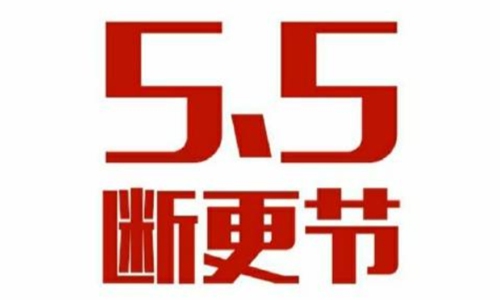Chinese web writers go on strike over copyright controversy
Source:Globaltimes.cn Published: 2020/5/6 2:02:50

Photo: Weibo
Some Chinese online literature writers stopped updating their stories on Tuesday in protest after China Literature, a leading online literature platform in China under Tencent, was recently accused of violating the authors' rights by enacting a contract which requires them to "unconditionally hand over all copyrights to the platform."
The strike aimed to bring public attention to the establishment of the "May-5-No-Updating-Day," a day set aside for internet writers to voice their concerns and safeguard their rights, according to an explanation of the campaign on China's social-media platform Sina Weibo.
The campaign mostly took place on Weibo, Zhihu and some other platforms, with many writers changing their profile pictures to a uniform image featuring the slogan "safeguard the copyright."
"From conception to all the words typed, every single bit of the work belongs to me. I don't want anyone to take it away from me," said one of the writers, AIZ, on Weibo.
The topic of the May-5-Day had received 37 million views on Sina Weibo as of press time. Many netizens supported the campaign, calling for more attention to the writers' rights.
"Only when the writers' rights are well protected, we readers can have more abundant work to read," one Weibo user said, attracting 500 thumb-up likes.
While writers intentionally stopped updating their work for the day, some found that the platform had automatically updated their articles saved in the drafts folder without telling them. Others said the platform threatened that authors participating in the campaign would get no recommendations in the future.
In response, China Literature denied the accusations and rejected the rumors on Tuesday, reported Sina Technology.
The company said it would hold communication meetings with authors on Wednesday to discuss relevant issues.
The controversy between the platform and the writers stemmed from a newly drafted contract between the two parties being exposed on the internet.
Some clauses in the contract are believed to be beneficial to the platform but unfavorable to the authors, mainly by taking away the author's copyright for their original content.
According to media reports, the contract requires the authors to "unconditionally hand over all copyrights to the platform. The platform has the right to license the copyright without authors' consent and will distribute no revenue to the authors."
China Literature has reportedly signed contracts with more than 8 million writers. The subscription revenue from readers is split 50/50 between the platform and authors, according to media reports.
Posted in: SOCIETY